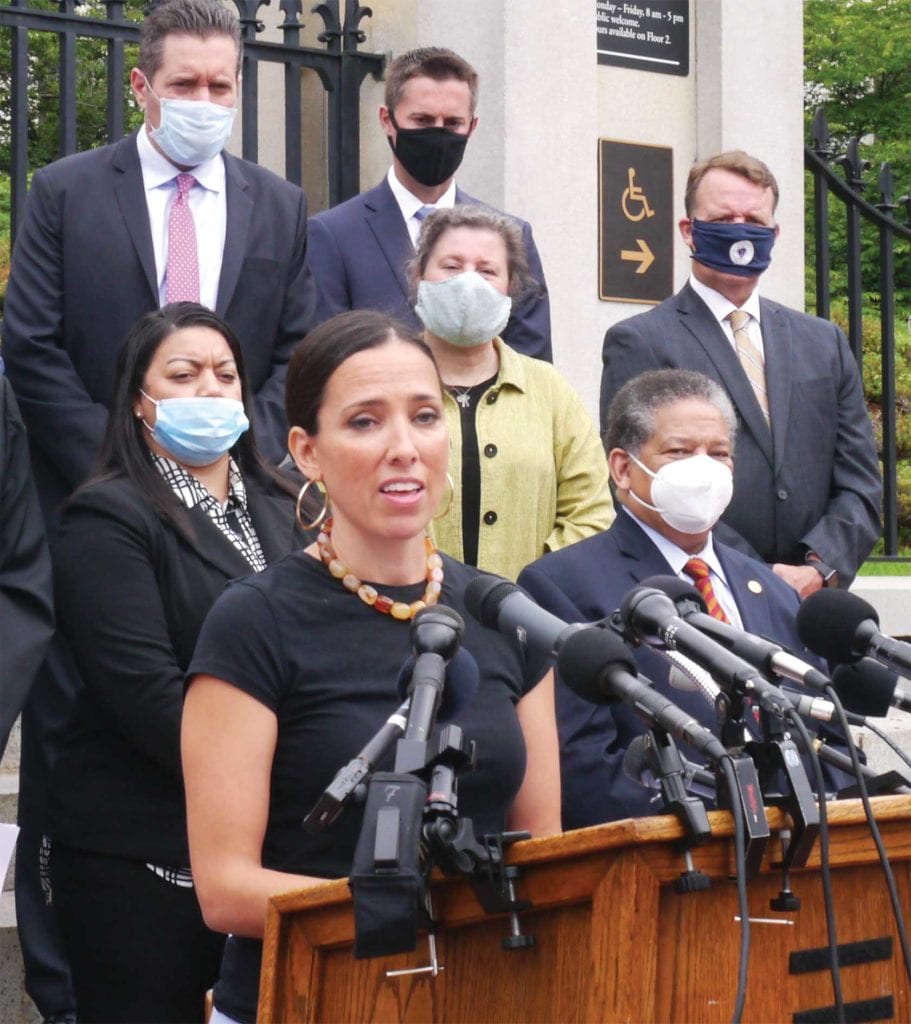Senate passes police reform bill
Police certifications, data collection and community reinvestment included

The state Senate passed what may be the most comprehensive police reform bill in state history Tuesday morning after an all-night session that saw debate on a raft of amendments.
The Reform, Shift + Build act contains provisions that place limitations on qualified immunity, require police departments to record and make public data on the race of people stopped by police and places limits on use of force and the acquisition of military-grade equipment. The bill also contains a provision that would direct the state to shift funding from policing and incarceration to job training and create economic opportunities in communities that have been adversely affected by over-incarceration.
“This bill is a vital step towards a new vision of public safety: one that’s built on accountability, de-escalation, and care,” said Sen. Sonia Chang -Díaz, co-chair of the Senate Working Group on Racial Justice, in a media statement. “It begins the long, necessary work of shifting power and resources to Black communities and communities of color who have, for too long, faced criminalization and punishment instead of investment.”
A key component of the bill is a Police Officer Standards and Accreditation Committee (POSAC), a group the bill’s authors say would be have the power to de-certify officers who are found guilty of engaging in acts of egregious misconduct. The committee would be made up of law enforcement officers and civilians, including criminal justice reform advocates. The committee would receive all complaints of misconduct against Massachusetts police officers, have subpoena power and would maintain a database of officer complaints.
School officials would be barred from sharing student information with police, except in cases of criminal misconduct or imminent harm, a provision that was sparked by a 2018 incident in which an East Boston High School student was detained by federal immigration authorities after school officials shared an incident report with Boston police.
The bill now goes before the House. Legislators have until July 30 to bring the Reform, Shift + Build act in front of Governor Charlie Baker.
The late-night session followed several days of debate in the Senate. That debate was halted twice by Republican Sen. Ryan Fattman, who repeatedly objected to hearings on the reform bill during senate sessions on Thursday and Friday because there was no public hearing held beforehand.
During Monday’s debate, Republican Sen. Dean Tran said that the bill creates a dangerous environment for law enforcement.
“Knee-jerk reactions and mandating without input will result in misinterpretation, resentment, and unintended consequences, such as the murder of police officers all across our country,” he said. He chastised a provision in the bill that makes school resource officers optional at the discretion of district superintendents. The measure ultimately passed.
Chang-Diaz pushed back on criticisms from GOP lawmakers.
“The critique that the bill hasn’t had a hearing is a technically convenient one,” Chang-Diaz told the Banner on Saturday. Proposed limits on qualified immunity, she said, “not only received a hearing before the Joint Committee on the Judiciary back in September, it has been favorably reported by that joint committee.”
Sen. Jamie Eldridge noted that many of the provisions in the omnibus bill were taken from existing police reform bills that have been vetted through hearings in the last two years. Members of the Black and Latino Legislative Caucus and the Progressive Caucus have in recent years led the push for criminal justice reforms, including many that are in the current bill.
Because the bill combines several pieces of legislation already proposed, Chang-Diaz said that a public hearing has been held for many of the bill’s provisions.
Sgt. Eddy Chrispin, president of the Massachusetts Association of Minority Law Enforcement Officers (MAMLEO), spoke at the State House on Sunday against the bill’s rollback of qualified immunity protections, which shield police from legal liability for actions undertaken while on duty.
“The real concern in this movement is not just in policing,” he said. “It’s about systemic racism. Policing is a small part of it. Let’s focus on the bigger issues, rather than just for the bill for the purpose of saying ‘Hey, we did something.’”
Scott Hovsepian, president of the Massachusetts Coalition of Police, said in a statement that police officers who act in good faith shouldn’t have to worry that “any step they take could end in a lawsuit that takes their home and life savings.”
U.S. Rep. Ayanna Pressley issued a statement urging the Senate to end qualified immunity for officers.
“In any other occupation in America, there are standards of conduct and consequences for violating them — doctors can be sued for malpractice, lawyers can be sued for negligence,” she said. “Policing should be no exception.”
The Massachusetts ACLU has made a point of calling out Massachusetts police officers who allegedly were not held liable for “egregious malpractice because of qualified immunity,” they said via Twitter on Friday. The group accused police of using threatening language to destroy the bill.
The Senate’s passage of the bill comes after demonstrations against police violence in the United States erupted across the country and around the world. While there have been relatively few police shootings in Massachusetts in recent years, there has been growing public support for police reforms.
“This Reform, Shift + Build Act meets the urgency of this moment,” said Senate President Karen E. Spilka in a statement sent to news media. “There is no doubt that we are in a difficult moment, both nationally and in our Commonwealth, but I’m proud of the Senate for listening to calls for racial justice and beginning the difficult work of reducing institutionalized violence, shifting our focus and resources to communities that have historically been negatively impacted by aggressive policing, and introducing many creative ideas to build greater equity and fairness in our Commonwealth.”






